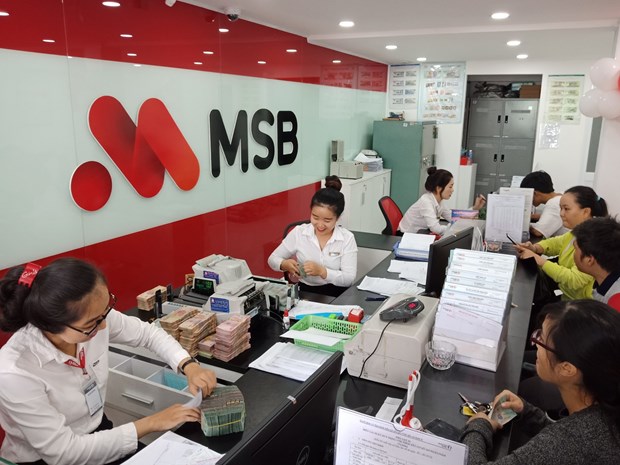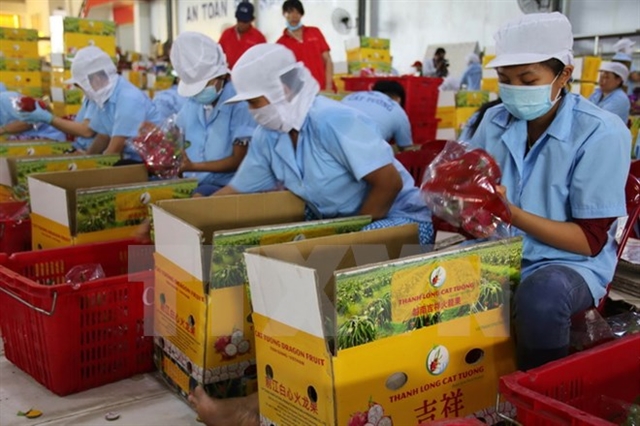Domestic banks have promoted lending to firms exporting to the UK to capitalise on the UK-Viet Nam Free Trade Agreement (UKVFTA) as Viet Nam’s shipments to the market have been growing impressively after more than a year since the deal took effect.

Domestic banks have promoted lending to firms exporting to the UK to capitalise on the UK-Viet Nam Free Trade Agreement (UKVFTA) as Viet Nam’s shipments to the market have been growing impressively after more than a year since the deal took effect.
The UKVFTA, which came into effect in early 2021, helped Viet Nam’s exports to the UK surge by 16.4 per cent year-on-year to US$5.7 billion last year despite the adverse impacts of the COVID-19 pandemic. Vietnamese products with a sharp growth in shipments to the market in the period were fruits and vegetables (67 per cent), coffee (17 per cent), pepper (49 per cent), iron and steel (1,269 per cent), and toys and sports equipment (19 per cent).
As shipments of the products to the UK are continually growing positively this year when the pandemic is under control, domestic banks are also stepping up lending to export firms that benefit from the UKVFTA to optimise the deal’s success.
According to Maritime Commercial Joint Stock Bank (MSB), it has been deploying a lending package for the exporters with preferential interest rates of 2.9 per cent per year for dollar loans and 5.7 per cent per year for dong loans.
MSB has also pledged to fund the exporters up to VND200 billion (US$8.7 million) without needing collateral so the exporters can buy input materials to meet large orders from the importing market.
The Bank for Investment and Development of Viet Nam (VietinBank) has been also launching preferential loan programmes, which are exclusive to the exporters, so they have many opportunities to access loans with low interest rates to serve their production and business needs.
Viet Nam International Bank (VIB) said the bank will further promote trade financing and improve services to better meet the needs of the exporters as the bank forecasts demands for the exporters’ products will grow strongly again after the pandemic.
Many other banks, such as HCM City Development Commercial Joint Stock Bank (HDBank), Vietnam Prosperity Commercial Joint Stock Bank (VPBank), Tien Phong Commercial Joint Stock Bank (TPBank) and Orient Commercial Joint Stock Bank (OCB), have also boosted financing for export firms.

Banking expert Can Van Luc told Viet Nam News that the UKVFTA contributes to significantly reducing tariff barriers and boosting Viet Nam’s exports to the UK market. Therefore, as a domino effect, the deal will have positive impacts on many Vietnamese supporting service industries, including banking and finance.
“Domestic banks have so far partly capitalised on the deal’s opportunities to promote their trade financing and payment services,” Luc said.
According to industry insiders, loans to export firms, especially those enjoying benefits of free trade agreements including the UKVFTA, will continually increase in the future as many banks are expanding lending to the segment.
The State Bank of Vietnam (SBV) has also issued an action plan on implementing the UKVFTA, in which it requires commercial banks to support exporters in accessing bank loans.
According to the SBV’s deputy governor Dao Minh Tu, in the high-tech agricultural sector alone, which is one of Viet Nam’s key export staples to the UK market, the SBV has directed commercial banks to lend to firms in the sector with preferential interest rates, which is some 0.5-1.5 percentage points per year lower than that of normal loans.
The Government has also simplified and cut steps in registration procedures and clarified criteria for the recognition of hi-tech agricultural projects so that small-sized businesses and farmers can better access credit.
However, total loans to high-tech agriculture have so far remained limited at VND111.64 trillion, Tu said, adding the central bank is continually targeting bank capital to high-tech agriculture to help the sector’s products meet the quality requirements of importing markets.
To better support exporters in accessing credit and expanding export markets, Luc said banks should develop and renew policies and procedures involved in granting agricultural and rural credit to each customer segment.
“It is necessary for banks to develop specific products, such as financing for supply and value chains, to support high-tech agricultural exporters,” Luc said.
In addition, experts said that banks need to have a detailed plan to recognise assets on agricultural land such as greenhouses and ponds as collateral.
Besides, it is necessary to extend the repayment periods when high-tech agricultural projects face natural disasters and adverse weather events.
In 2022, the SBV targets a credit growth at 14 per cent, but notes it could adjust the target depending on the actual situation. It requires banks to prioritise capital for production and business, especially export firms, to recover the country’s economy and capitalise on the rebound of global consumption demand after the pandemic. Bank loans to high risk industries, such as corporate bonds, real estate and securities, have been restricted.
According to the SBV’s data, bank credit in the first half of this year surged by 17.09 per cent against the same period last year. The surge was in line with the more positive developments of the country’s economy after the pandemic was brought under control. — VNS
- Tags
- UKVFTA
- bank lending





